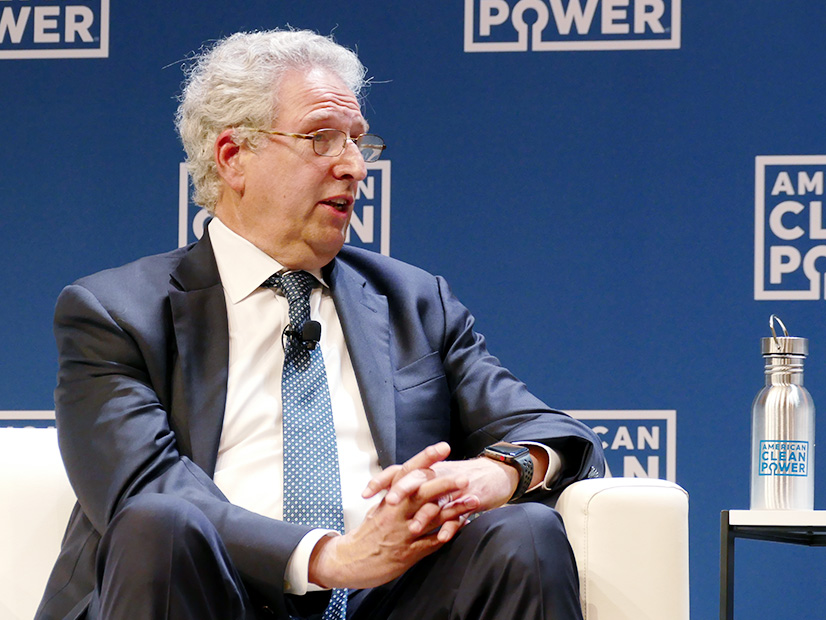The White House announced Friday that President Biden will nominate FERC Chair Richard Glick for another five-year term.
If confirmed, Glick could be on the commission well into 2027 and could remain chair as long as Biden remains president or another Democrat succeeds him after 2024. If a Republican is elected, Glick would be demoted, but the commission could retain a Democratic majority until 2026, when Commissioner Willie Phillips’ term expires.
Glick was originally nominated alongside Republican Neil Chatterjee by President Donald Trump and joined FERC in November 2017, when the commission’s sole member was acting Chair Cheryl LaFleur. Glick filled the seat left open by Colette Honorable’s resignation and was the lone Democrat — and often voice of dissension — for more than a year, between when LaFleur resigned in August 2019 and Commissioner Allison Clements joined in December 2020.
Before joining the commission, Glick was general counsel for the Democratic members of the Senate Energy and Natural Resources (ENR) Committee.
Glick was unavailable for comment over the weekend and had not tweeted anything as of press time.
Transmission Planning, Gas Policy Highlight First Term
His tenure has so far been marked by efforts to re-examine the commission’s policies on transmission planning, natural gas pipeline certificates and RTO capacity markets. Those efforts have been appreciated by renewable energy interests and environmentalists and criticized by the fossil fuel sector and the commission’s Republican minority, especially Commissioner James Danly.
In February, he and his fellow Democrats received more widespread criticism for a pair of policy statements on how the commission would more closely scrutinize evidence of need for pipeline projects and evaluate the impacts of their greenhouse gas emissions in environmental analyses. The statements were released without notice for comment and would have applied retroactively to all projects already pending before the commission.
The Democratic majority was later excoriated for the move by members of the ENR Committee — mostly Republicans, but also Chair Joe Manchin (D-W.Va.), whose support may prove necessary for Glick to continue in his post. (See Glick: No Regrets over Gas Policy Statements.)
A month later, FERC walked the policy statements back, labeling them as drafts and saying any new rules would apply only to future projects. (See FERC Backtracks on Gas Policy Updates.)
Glick won plaudits for his outreach to state regulators in a bid to accelerate transmission development. (See FERC-State Task Force Considers Clustering, ‘Fast Track’ to Clear Queues,)
But he has come under criticism for proposing a reinstatement of federal rights of first refusal (ROFR) in the commission’s April 21 Notice of Proposed Rulemaking on transmission planning and cost allocation. (See ANALYSIS: FERC Giving up on Transmission Competition?)
Former FERC Chair Jon Wellinghoff and Paul N. Cicio, chairman of the Electricity Transmission Competition Coalition and CEO of the Industrial Energy Consumers of America, called the ROFR proposal “a costly giveaway” to incumbent utilities that have circumvented FERC Order 1000’s rules encouraging competition in transmission development, citing data that only 3% of all transmission projects are competitively bid.
In a May 15 op-ed in The Hill, Wellinghoff and Cicio said that transmission costs in RTO/ISO markets “increased by $74.9 billion or 78.7%, while electricity demand was flat” from 2014 to 2020.
“Competition brings out innovation, a solution to inflation and an American norm — but the power sector is different,” they wrote. “Utilities make money by spending money and recover it in consumer rates with a 10 to 12% annual after-tax return on investment. The more they spend the more they earn.”
Reaction
On Friday, Chatterjee — himself a former Senate adviser, on the other side of the aisle — tweeted that Glick “is a great person and dedicated public servant. He’ll have to answer some tough questions, but if he continues to strive for bipartisan consensus on the contentious issues before FERC, he’ll be in a strong position for a second term.”
Responses to the news from stakeholders ranged from celebratory to tepid.
Both Advanced Energy Economy and the American Council for Renewable Energy “applauded” the announcement, with AEE Managing Director Jeff Dennis saying Glick “has provided steady leadership at FERC” and ACORE CEO Gregory Wetstone saying he has been “exceptionally effective as chair.”
WATT Coalition Chair Ted Bloch-Rubin congratulated Glick, saying that “FERC has made great strides towards policy to improve the United States’ transmission system planning and operation” under his leadership.
Electric Power Supply Association CEO Todd Snitchler was less enthused, saying that the organization “looks forward to a robust conversation around issues critical to the Federal Energy Regulatory Commission’s jurisdiction with the re-nomination. … [It] comes at a time when FERC’s mission to ensure reliable, safe, secure and economically efficient energy for consumers has never been more important.”
EPSA is challenging PJM’s narrowed minimum offer price rule (MOPR) in the 3rd U.S. Circuit Court of Appeals. The group contends it threatens the competitiveness of the capacity market and that FERC failed to give adequate reasoning for allowing the rules to go into effect. (See PJM MOPR Challenge May Set Legal Precedent on FERC Deadlocks.)
Glick was among four other intended nominees “to serve as key leaders” in the administration that the White House announced late Friday afternoon; none of the four other posts is related to energy policy.




